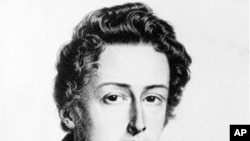This spring marks the 200th anniversary of the birth of Frederic Chopin, who was born and raised in a village just outside Warsaw. His musical legacy forms an integral part of modern Poland's cultural identity.
For any visitor to Warsaw, it does not take long to realize that Frederic Chopin is everywhere. Schools, streets and even the international airport are named after him. Hundreds of people turn up every summer for free Chopin concerts in a Warsaw park, beneath a towering statue of the man himself.
People often assume that Chopin was French - he spent half his life in France and is buried there in the famous Pere Lachaise cemetery in Paris.
But for many Poles, Chopin is the embodiment of their nation's spirit. When they listen to his mazurkas and polonaises, they hear not only the strains of Polish folk music, but also nostalgia and patriotism for his homeland.
Former Minister of Culture Waldemar Dabrowski is adamant about Chopin's legacy.
Chopin taught us what it means to be a patriot, he says, and he symbolizes what Poles want to achieve in shaping our culture today.
This year marks the 200th anniversary of Chopin's birth, and the Polish parliament has declared 2010 to be the official Year of Chopin.
Stanislaw Leszczynski of the Warsaw-based Chopin Institute is helping organize the year-long events. He says that even during Chopin's lifetime, he was the best ambassador of Polish culture, and remains so to this day.
Chopin was born in Żelazowa Wola, a tiny village about 50 kilometers west of Warsaw. His family home is an elegant two-story manor house on spacious grounds. Today it is a museum. Inside are precious artifacts from the family's daily life, including scraps of hand-written poetry and the manuscript of a polonaise written by young Frederic when he was eight-years-old.
The Chopin family later moved to Warsaw, where Chopin became known as a child prodigy. But in 1830, while he was touring Europe, Poland's Russian rulers crushed an uprising, sending many Polish artists into exile. On the advice of a friend, Chopin settled in France. He would never again set foot in his native land.
Chopin spent years pining for Poland, and never entirely mastered the French language. As he was dying of tuberculosis at the age of 39, he asked that his heart be removed and taken back to his homeland. Today it is preserved in an urn in a Warsaw church.
French tourist Marie Claude Monchablon says that her love of music inspired her to visit Poland. During a visit to Chopin's birthplace, she says that for music lovers like herself, it is impossible to forget that Chopin's heart is here.
On March 1, Warsaw unveiled a new, state-of-the-art Chopin museum. It features an innovative electronic information system, and the collection includes rare items like Chopin's last piano and his passport.
Museum curator Alicja Knast explains that she and her colleagues had to fight hard at auctions to collect the last remnants of Chopin's life, but, she says they felt it was their obligation to finally provide Chopin with a home.
To one young man in Żelazowa Wola, the most important thing about Chopin is that he showed the world that Poles can achieve great things. He said he hopes 2010 will make people realize that Poland is more than just an obscure country they can't find on a map. Maybe, he adds, it might even make people want to visit.
Poland Celebrates 200th Birthday of a National Icon










